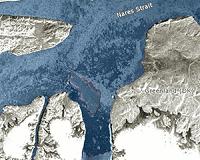 |
Paris (AFP) Dec 15, 2010 There is no "tipping point" beyond which climate change will inevitably push the Arctic ice cap into terminal melt off, according to a study released Wednesday. The northern polar cap has shrunk between 15 and 20 percent over the last 30 years, unleashing concern that on current trends -- with regional temperature increases twice or triple the global average -- it could disappear entirely during the summer months by century's end. One of the factors in this calculation is a so-called positive feedback, in which a reduced area of floating ice helps to stoke global warming. As ice cover recedes decade by decade, more of the Sun's radiative force is absorbed by dark-blue sea rather than bounced back into space by reflective ice and snow. But a new study published in the British science journal Nature shows that there is nothing inevitable about this process, and that it can be halted or even reversed. "There is no 'tipping point' that would result in unstoppable loss of summer sea ice when greenhouse gas-driven warming rose above a certain threshold," said Steven Amstrup, a professor at the University of Washington and lead author of the study. Up to now, many scientists worried that there was an as yet unidentified temperature threshold which, once passed, would doom the ice cap. But the study, based on computer models, indicates that if annual emissions of greenhouse gases are substantially reduced over the next two decades, an initial phase of rapid ice loss would be followed by a period of stability and, eventually, partial recovery. If so, that could mean a reprieve for polar bears, which use floating ice shelves as a staging areas for stalking ringed and bearded seals, their preferred food. Already today, many of the majestic predators are teetering on the edge of starvation because the ice melts sooner in spring and forms later in autumn, shortening their hunting season. The new research "offers a very promising, hopeful message," said co-author and University of Washington professor Cecilia Blitz. "But it's also an incentive for mitigating greenhouse gas emissions," she said in a statement. In earlier research, Amstrup and colleagues had calculated that only a third of the world's estimated 22,000 polar bears would still be around by 2050, and that even these survivors could eventually disappear. In 2008, Washington listed polar bears under the Endangered Species Act. Earlier this week, more than 150 biologists and climate scientists called in an open letter on US President Barack Obama to step up action to save the Arctic's top predator. The US Department of the Interior faces a court-imposed deadline next week on whether polar bears should continue to be classified merely as "threatened" or given maximum protection under US law as "endangered." And a separate study also published in Nature Wednesday warned that melting ice was pushing Arctic mammals to breed with cousin species, in a trend that could be pushing the polar bear and other iconic animals towards extinction.
Share This Article With Planet Earth
Related Links Beyond the Ice Age
 Greenland Ice Sheet Flow Driven By Short-Term Weather Extremes Not Gradual Warming
Greenland Ice Sheet Flow Driven By Short-Term Weather Extremes Not Gradual WarmingVancouver BC (SPX) Dec 10, 2010 Sudden changes in the volume of meltwater contribute more to the acceleration - and eventual loss - of the Greenland ice sheet than the gradual increase of temperature, according to a University of British Columbia study. The ice sheet consists of layers of compressed snow and covers roughly 80 per cent of the surface of Greenland. Since the 1990s, it has been documented to be losing appro ... read more |
|
| The content herein, unless otherwise known to be public domain, are Copyright 1995-2010 - SpaceDaily. AFP and UPI Wire Stories are copyright Agence France-Presse and United Press International. ESA Portal Reports are copyright European Space Agency. All NASA sourced material is public domain. Additional copyrights may apply in whole or part to other bona fide parties. Advertising does not imply endorsement,agreement or approval of any opinions, statements or information provided by SpaceDaily on any Web page published or hosted by SpaceDaily. Privacy Statement |